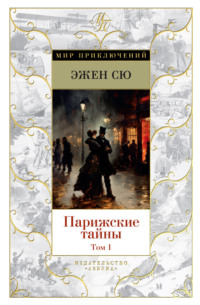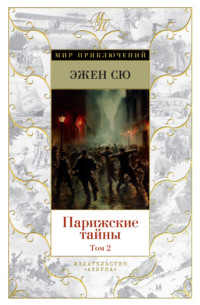
The Abbatial Crosier; or, Bonaik and Septimine. A Tale of a Medieval Abbess
"Yes, it is I… Good-day to you, Bertchram!"
Bertchram alighted from his horse and ran toward the young man to contemplate him closer. "It is he … and no mistake! And what are you doing here, valiant count, in the company of these beggars?"
"Speak not so loud. I am on a mission from Charles."
"Bareheaded in that way? Without arms, your clothes soiled with mud and almost in rags?"
"It is a disguise that I have assumed."
"You are a wily customer! Whenever the good Charles had some delicate matter in hand, it was always you he charged with it, because you are more subtle than any of us others. Charles always said to me: 'Bertchram, you would be a terrible man if your brain were as powerful as your fist!' You probably do not know that I am the bearer of a message to you?"
"What is the message about?"
"Simply this, that I come to replace you as abbot at the abbey of Meriadek."
"Charles is master, he can give and take back again."
"Do not look upon the substitution as a disgrace, Berthoald! Far from it! Charles raises you to the rank of duke, and he reserves for you the command of his vanguard in the war he is about to undertake against the Frisians. 'Upon the word of the Hammerer,' he said to us, 'I was a fool in confining to an abbey one of my youngest captains, and at this season when wars break out so unexpectedly; it is now, when I have not Berthoald at my side, that I feel how much I need him. The post I gave him is good for an aged soldier; it fits you better than him, old Bertchram, go and take the place of Berthoald and his men; you shall give him this letter from me, and as a pledge of my constant friendship, take to him two of my best horses; besides that, take to him from me a magnificent armor of Bordeaux. He loves fine armor and fine horses. It will please him.' And there they are with me," added Bertchram. "The horses are led by the bridle. They are beautiful, one is as black as a raven, the other white as a swan. As to the armor, it is carefully packed up in my baggage, I cannot show it to you now. It is a masterpiece of the most famous armorer of Bordeaux. It is enriched with gold and silver ornaments. The casque is a marvel."
"I am truly touched with this fresh proof of Charles' affection," answered Amael, "I shall report to him as soon as I have fulfilled his mission."
"But he wishes you to join him immediately, as you will see by the letter that I have carefully put away in my cuirass," said the warrior hunting for the parchment.
"Charles will not regret to see me arrive a day or two later if I return to him after successfully attending to the mission that he confided to me. I shall find the horses and the armor at the abbey, where I shall see you again, and now I shall move on with my men. But you must have made a wide circuit, to judge by the road you are on!"
"Charles gave me the command of a large troop that he has cantonned on the frontiers of Brittany."
"Does he expect to attack Armorica?"
"I do not know. I left the troops entrenched in two old Roman camps, one to the right, the other to the left of a long road that winds up there."
"Is the troop large?"
"About two thousand men distributed in two camps."
"Charles can undertake nothing against Brittany with so small a number of soldiers."
"All he expects to do is to reconnoiter the frontier of the country until after the war with the Frisians is ended, when he will be able to give his attention in person to the accursed Armorica. This province has resisted our arms for more than three centuries, since the glorious Clovis conquered Gaul. Indeed it is a shame to us!"
"Yes, the independence of Armorica is a shame to the arms of the Franks."
"Here is Charles' letter," said Bertchram pulling from under his cuirass a scroll of parchment that he delivered to Amael, and ordering the two horses which his slaves had unsaddled to be brought forward, he added: "Look at them! Are there any nobler or more spirited animals in the world?"
"No," answered Amael unable to avoid admiring the two superb stallions, that were with difficulty held by the slaves. The horses reared and caracoled, daintily striking the ground with their hoofs; one was ebony black, with a bluish tinge; the other, white as snow, shone like silver. Their nostrils were inflated, their eyes sparkled under their long manes, and they lashed the air with their flowing tails.
"These are noble horses!" said Amael smothering a sigh; and motioning to the slaves to re-cover the animals with their housings, he muttered: "Adieu, fine battle horses! Adieu magnificent armors!" Turning to the Frank, Amael said: "I wish you a happy journey… I shall see you again at the abbey of Meriadek where I hope you may enjoy yourself."
"Adieu, Berthoald; but … a thought strikes me. Should your men refuse to admit me during your absence, what shall I do?"
"Keep Charles' letter; it will notify my men of Charles' pleasure. You may break the seal before them."
"I shall do it that way. Adieu, I shall take your place at the abbey, where I expect to have a dull time until your return. Adieu, and come back soon."
"One more question… Who are the chiefs of the troops that are cantonned near the frontiers of Brittany?"
"Two friends of yours, Hermann and Gondulf. They asked me to remember them to you."
"Now, good-bye."
"Good-bye, Berthoald."
The chief of the Frankish troops, having resumed his march, followed by his troops and train, soon disappeared before the eyes of the fugitives. Amael returned to the tree under which his traveling companions were assembled. Hardly had he taken a few steps towards them when his mother opened her arms to him: "Come, my son; I have heard every word. Now, at least, your renunciation of a brilliant career, that might have dazzled you, is voluntary!"
"You were near me, mother, and yonder I saw the frontiers of Brittany. Could I be dazzled by any favors from Charles against my mother and my country?"
"Oh!" cried the matron tenderly pressing Amael to her breast. "This day makes me forget all that I have suffered!"
"And this, mother, is the first happy day that I have had in years – a day of unalloyed happiness."
"You see I was right, your son's heart remained true," said Septimine to Rosen-Aër with touching kindness.
"Septimine!" replied Amael with a look of tenderness, "would you doubt my heart in the future?"
"No, Amael," she answered naïvely, looking at the young man with an expression of timidity and surprise. "I shall never doubt you."
"Mother, this sweet and brave girl saved your life; she is now a fugitive, forever separated from her family. If she should consent to give me her hand, would you accept her as a daughter?"
"Oh, with joy! With thankfulness!" said Rosen-Aër. "But would you consent to the union, Septimine?"
Blushing with surprise, with happiness and confusion, the girl threw herself on the neck of Amael's mother, and holding her face on the matron's breast, murmured:
"I loved him since the day he showed himself so generous toward me at the convent of St. Saturnine. Did he not there protect me?"
"Oh, Rosen-Aër!" now exclaimed the old man who had stood near wrapped in thought, "the gods have blessed my old age, seeing they reserved such a day for me." And after a few seconds of silent emotion, shared in by the young apprentices, the old man proceeded, saying: "My friends, if you will take my advice, let us resume our march. We shall have to walk briskly in order to arrive to-morrow evening at the frontier of Armorica."
"Mother," said Amael, "lean upon me; you will not now refuse the support of my arm?"
"No, oh, no! my child!" answered the matron with tenderness, and brimful of happiness, taking her son's arm.
"And you, good father," said Septimine to the old goldsmith, "you lean on me."
The fugitives resumed their march. After having traveled without accident until night and the following day, they arrived at moon-rise not far from the first spurs of the wild and high mountains that serve both as boundary and as ramparts to Armorica. The sight of his native soil awoke in Bonaik the recollections of his boyhood days as if by enchantment. Having before now crossed the frontiers with his father in order to attend the Breton fairs, he remembered that four druid stones of colossal size rose not far from a path that was cut between the rocks, and that was so closely hemmed in, that it allowed only one person to march abreast. The fugitives entered the path one after the other and began climbing the steep ascent. Amael marched first. Presently they arrived at a little clearing or platform, surrounded by precipices and beetled over by huge rocks.
Suddenly the fugitives heard from a far distance above their heads a sonorous voice, that, quivering through the surrounding and profound silence of the night, melancholically chanted these words:
"She was young,She was fair,And holy was she;Hena her name,Hena, the Maid of the Island of Sen."Rosen-Aër, Bonaik and Amael, the three descendants of Joel, remained for a moment transfixed with exaltation, and yielding to an irresistible impulse all three fell upon their knees. Tears ran down their cheeks. Septimine and the apprentices, sharing the emotion which they were unable to account for, also fell upon their knees, and all listened, while the sonorous voice which seemed to descend from the skies, concluded the Gallic chant now eight centuries old.
"Oh, Hesus!" finally exclaimed Rosen-Aër, raising her tear-stained face toward the starry vault where the sacred luminary of Gaul was shining in its splendor, "Oh, Hesus! I see a divine omen in this chant, so dear to the descendants of Joel… Blessed be the chant! It salutes us at this solemn hour when, at last setting foot on this free soil, we return to the ancient cradle of our family!"
Guided by the old goldsmith, Amael, his mother, Septimine and the apprentices, arrived in the vicinity of the sacred stones of Karnak, and were tenderly received by the sons of Bonaik's brother. Amael became a field laborer, the young apprentices followed his example and settled in the tribe. At the death of Bonaik, the abbatial crosier, which he had finished at his leisure, was joined to the relics of the family of Joel accompanied by this narrative which I, Amael, the son of Guen-Ael, who was the son of Wanoch, who was the son of Alan a grandson of Ronan the Vagre through Ronan's son Gregory, wrote shortly after our return to Brittany.
THE END








